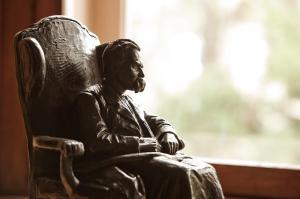Excerpted from Curt Paul Janz’s last volume of his biography, Friedrich Nietzsche. Biographie. Band 3: Die Jahre des Siechtums, Chapter “The Catastrophe”:
Omens
In the last months before the disaster, acute disturbances of the understanding of reality and his identity increasingly piled up. A fact whose significance cannot be underestimated is that Nietzsche’s philosophical thought is definitely interrupted with the Antichrist on September 30, 1888. In a completely wrong assessment of the magnitude and significance of the matter, Nietzsche wants to see from that date a new beginning, a new measure of time, and what happens is the beginning, just for him, of a “new” time, a new and radically different consciousness.
What is perhaps the most significant part of his philosophy, the critique of knowledge, seems totally forgotten. Nietzsche no longer speaks of moral and cultural criticism; there are only vague memories of the world of Zarathustra (lyrical content is precisely what revives in some poetry). On the contrary, neither the “overman” or the “eternal return” are any longer defended.
With the alleged murder of Pauline Christianity as inverted Platonism and as a building for Jewish priestly power, Nietzsche believes he has finished the major philosophical work. Everything else, all “revaluation of all values” naturally follows that, so that he is no longer committed but to ensure the propagation of this final “knowledge.” With it, on September 30, 1888 philosophy is finished!
“It’s all over,” Nietzsche writes to Carl Fuchs on December 18. Even before, it shone occasionally, and strangely, this split regarding his own work. Thus for example on July 18, 1888, Nietzsche makes the arrogant statement to Fuchs: “I have given men the deepest book they possess, my Zarathustra” (which is also repeated multiple times to other recipients), and Nietzsche adds a few lines later: “Since then I do nothing but buffoonery to keep beating a vulnerability and an unbearable tension,” an idea—that of being the “jester of the millennium”—that continues well into the time of the transition into darkness. The strangeness toward his latest work, The Genealogy of Morals, can be captured more accurately in the letter of August 22, 1888 to Meta von Salis:
The first glance I threw inside surprised me: I discovered a long prologue… whose existence I had forgotten… Actually I kept in memory only the title of the three treaties: the rest, the content, was lost. This is the result of extreme intellectual activity… which, as it were, had brought a wall in the middle… Those times I underwent an almost uninterrupted state of inspiration, so that this text emerged as the most natural thing in the world… The style is passionate and disturbing, full of finesses: flexible and colorful as I had not written such prose before.
Nietzsche took another decisive step still further in this way when he confesses to Köselitz on December 9, 1888:
A few days ago I leafed thru my writing, for which only now I am mature… I’ve done everything very well, but I had never thought of it… Damn, how much is hidden in there! —In the Ecce homo you will find a discovery on the third and fourth Untimely Meditations that will put you on the willies, as it did to me. Both speak only about me, anticipating… Neither Wagner nor Schopenhauer appear there psychologically… I could only understand these writings four days ago.
The reference to Ecce homo is to be taken very seriously. For very valuable and significant the biographical and data regarding the history of his work are, in this letter the interpretations of his books are to be taken with extreme care. The Nietzsche of Ecce homo is no longer the Nietzsche who wrote a philosophical work. He is now facing a stranger. He “interprets it,” thinks he only now understands his work; that only now he has a feel for it. Unwittingly, with the signing of the letter he reveals that he is not the same: “Yours, the phoenix.”
Thus start the mystifying pseudonyms. For example, in the December 18 letter to Fuchs he is “the monster,” and after the collapse the pseudonyms take full possession of him. After philosophy, what Nietzsche first lost is his identity. Just two weeks later, on December 31, 1888 (to Köselitz) he does not already know his address: “Suppose it could be in principle the Palazzo del Quirinale.” Turin, from which emerged the young Italian kingdom, and Rome, from where it dominates now, merge into one before that blotchy look.
Later Nietzsche sees himself as the organizer of a European congress of princes, who wants to convene on January 8, 1889 in Rome, the heart of “Imperium Romanum.” He has already drafted the invitations: one for the Italian king Umberto II, another for Mariani, the papal secretary of state, and one for the “House of Baden.”
What remains for the moment is poetry and music. But even poetry could not be maintained for long…
